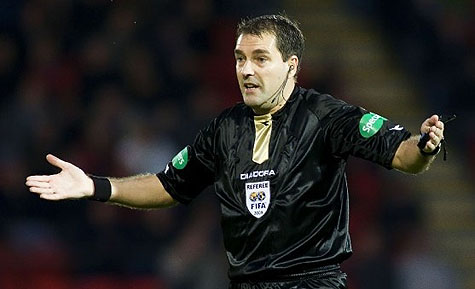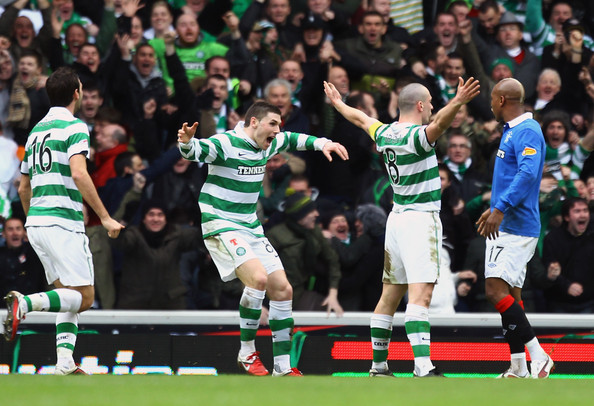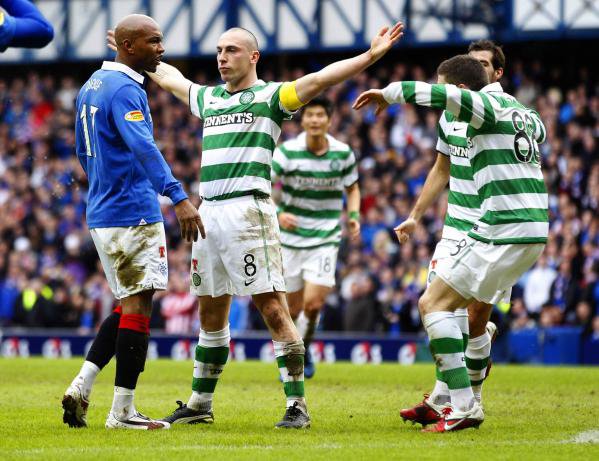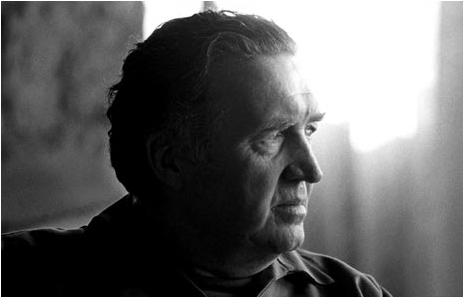Referees in Scotland must be some of the most isolated people in sport. They get paid little by comparison to the players they have to control, so they can’t hide away in their big gated houses like some players who have a dip in form. The decisions they make are swept under the carpet for the most part by a shroud of darkness – the referees aren’t allowed to talk to the press to explain their decisions. Indeed, the English are having this very debate themselves following the bizarre refereeing decisions involved in Manchester United’s second goal against Tottenham Hotspur.
But this is where the real issue in Scotland lies with referees. The fact that their decisions – particularly their bad ones – so often go unexplained is a breeding ground for accusations of incompetence and cheating. Is that the case? Well, we don’t know because no one tells us. If we question the decisions, we’re shot down as paranoid Celtic fans. This is despite the fact other fans of other clubs question decisions just as much as we do. Well, except one club.
Okay, so the SFA set up the whistleblower web site where the referees could pick and choose certain incidents that they can tell us about, but what does that gain us? Very little if they don’t chose to tell us about the most controversial decisions. I’ve rarely seen a decision explained on that web site that I actually cared about. There certainly hasn’t been an explanation for Willie Collum’s eyes on the back of his head, something which has been swept under the carpet amid the fallout following our visit to Tannadice, and the penalty that wasn’t.
Had Dougie McDonald been interviewed immediately after the game, he could have had the opportunity to tell us that he’d blown for a penalty too quickly and on reflection had decided it was a bad call. Given he was about to change a big decision at an important time in the match, he wanted to be absolutely certain it was the right call and as such he consulted with his linesman who agreed with him. And so the decision was overturned. Everyone knows that people make mistakes in life, especially in the heat of the moment, so we all accept the change in call and we move on. Well okay, the Celtic support moan that the defender was the first foul and he’d missed that entirely, but at least we know what his thinking was. Lets face it, fans have moaned through the history of football about the refereeing decisions. Some things will never change.
Of course, it’s quite possible he wouldn’t have told us the truth. After all, he didn’t tell the match supervisor the truth, nor did he tell Neil Lennon the truth. It was only when he went home and thought about what he had done that he decided to phone his boss and tell him the truth. So if given the opportunity on live TV, would he have told us what had REALLY happened? Perhaps, perhaps not. The point here is that he doesn’t even get the chance to nip the story in the bud.
Dougiegate, Cravengate, Dallasgate. Whatever it’s called, it cannot be allowed to simply disappear with the resignation of one linesman and a slap on the wrist for one referee. Hearts have already called for a more open, transparent process to be put in place. An overhaul of the archaic system that is currently in place. They rightly point out that what everyone really wants is for standards of refereeing to improve, and for the removal of all the secrecy in the processes. It’s this point that needs to be focused on, and it’s this opportunity for good and much needed change that’s going to be lost as the SFA rapidly closing ranks.
All three men at the centre of the issues have had their say. We’ve had a representative of a referee’s union have his say, and we’ve had the current SFA Chief have his say too. So what have we learned from all the interviews?
Well, both McDonald and Craven agree on certain things. McDonald blew his whistle for a penalty. It was McDonald that changed his mind and went to the linesman. There was no call of “Dougie, Dougie” from linesman Craven as the official report said and as Neil Lennon was told. Nevertheless, both men agreed that the keeper had touched the ball and that decision should be overturned.
Despite the emphasis, they also both agree about what happened at full time. McDonald seems to be insisting that it was Craven’s idea to lie about what happened. But then what he insists and what facts he give don’t match up. His facts – that Craven removed his earpiece and mic to ask McDonald what they would tell the supervisor to which he himself replied with the “Dougie, Dougie” suggestion – says that Craven was concerned as to what they should tell the match observer. That’s different from actually being the one to suggest that they lie. Craven’s side of the story backs this up. So there is no doubt that McDonald is the one who said they should lie, not Craven. Indeed, it makes no logical sense for the linesman to wrongly incriminate himself in the decision when it would only reflect worse on him. If your colleague had screwed up, why would you volunteer to lie to protect him? He’d done his job properly after all. He’d taken up position for the penalty, but when asked by the referee for assistance he gave it. And he would give it again by taking part in the lie. It’s one thing to volunteer to lie to protect, it’s quite another to be asked to lie to protect. You would do the latter for a mate, or even just a good colleague.
And so the lie was told to the match observer – by McDonald as is the done thing. The referee is the main man, he’s the one that talks to the observer. The lie was then repeated to Neil Lennon, who had asked for clarification of the decision. Hugh Dallas would reflect later that Lennon was happy with the explanation. We can discount Dallas’s account since he wasn’t there, although he suggests that it’s what both McDonald and the other linesman who was also present had told him. Craven suggested that what Lennon had actually agreed to was the suggestion that it was “better to win by a legitimate goal than a dodgy penalty”. I suggest that’s pretty obvious – anyone would agree to that statement!
So everyone goes home. But Dougie’s conscience is eating away at him. He knows he’s lied. Not a white lie like telling your kids about Santa… Thanks for spoiling that little fairy tale by the way, I hope no one’s kids picked up on that, the last thing the SFA need is to be known as the association that killed Christmas… but a big whopper of a lie that bothers you. So he gets in touch with the head of refereeing development at the SFA, Mr Hugh Dallas.
Again, McDonald and Craven agree here, as does Dallas. Both of them say it was McDonald that got in touch with Dallas to tell him the truth of what had happened and who had made the decision to change the penalty call. Dallas then contacts Craven to get his story, something else all three men agree on.
But once again, while the facts match up, the emphasis on key points is different. In Craven’s version, Dallas phones him up demanding to know if he had called McDonald over with the “Dougie, Dougie” shout. A shout that the match observer, who also has access to the headset communications, never heard – although admittedly the observer suggested it was quite loud in the stadium at the time so he may have missed it. Craven suggests that Dallas persisted with the belief that he had shouted this and would not accept the truth. The Dallas version actually backs this up to an extent. Dallas himself admits that he asked Craven TWICE if he’d shouted “Dougie, Dougie”. Dallas may think he’s only trying to be crystal clear about the facts, but when this is your boss asking you the same question more than once – one that you clearly don’t get on with – you’re bound to feel intimidated.
McDonald doesn’t go into details about what happened next. Craven’s story is that he spoke to McDonald again after Dallas had interrogated him. According to Craven, McDonald suggests that maybe Dallas is testing him. Sounds to me like McDonald is defending Dallas’s accusing tone as part of some kind of refereeing character test. We’ll pick up again on Dallas and his peculiar methods later.
It’s Tuesday by the time Hugh Dallas makes his statement to the media. In it, Dallas suggests that the right decision has been made and all’s well that ends well. He’s very careful in his wording of how the decision was arrived at, stating that McDonald had “received information from the assistant referee” – never quite venturing into who had initiated contact. For a man who at this point knows that both McDonald and Craven have admitted lying, he’s being very diplomatic with his words here.
On Wednesday, Craven resigns. It’s Friday before Craven gets confirmation that his resignation has been accepted. Craven himself says that he finally made the decision after he received the match report and saw that he had been marked down for an offside that he got wrong. Now, I’m not sure how this fits with the whole story, but he seemed to think it was somehow relevant to his decision to quit. He’s the only one to mention this. If the match report is the same report that CQN posted then I cannot find evidence of this offside decision either. However, I’ll accept there could be another report that we haven’t seen. The CQN match report does however show in black and white that the observer was told by the officials the “Dougie, Dougie” lie.
The SFA launch an inquiry into the resignation. While the findings end up with new SFA Chief Stewart Regan the Wednesday following Craven’s resignation, it is not until the Friday that they are made public – after the referees have had a chance to deal with the findings themselves of course. Yet more fuel for the paranoia by once more being far to opaque.
When Regan takes the Friday press conference, he reveals the truth that we all suspected – that there was no “Dougie, Dougie” call and that McDonald had been the one to initiate the change in the decision. Regan tells us that Craven’s resignation was due to the fact that he felt his role in the penalty decision being overturned had not been full articulated. No mention of being hacked off about an offside decision you’ll note.
Regan’s other revelations include the fact that McDonald was given a 7.9 rating for the game. Now, there was no indication that this was the actual score he got – the point they were making was that anything below 8 was not good enough. The tone of the statement could indicate that he had less than 7.9, but that all scores below 8 are referred merely to being “a 7.9”. I’m guessing it’s the same way as when you are at school – if you fail, you get an F, no one cares how big an F. Regan also tells us that McDonald has been given a warning for not fully articulating how the penalty decision was overturned. Interesting, that means that despite the “7.9” he was not warned for being poor, just for lying. Makes you wonder what the real worth of a “7.9” is. Especially since McDonald was back to fourth official business in the Hearts v Kilmarnock match, and fully expects to get more SPL games in the future. Does this prove that it doesn’t matter how badly you referee a match, you’ll still be back?
Regan’s other suggestion was that both the players, managers and the media have to stop handling the refereeing issues they way they are. He indicates that he’ll be trying to implement a new respect initiative for the referees to protect them more. Sorry Stewart, but respect is earned, not demanded. This lot have hardly earned it, and if the rest of Craven’s story is to be believed, they certainly don’t deserve it.
Craven didn’t just tell his side of the Tannadice debacle. He told us of a culture of harassment, victimisation and bullying within the refereeing community. Not from the SPL managers or the media as has been suggested, but from within. From Hugh Dallas and his assistant, John Fleming.
Craven says that he was once blamed for Kirk Broadfoot getting a booking in a Kilmarnock v Rangers game. There’s no indication when this game took place, but Craven suggested it was purely the referee’s decision – he wasn’t consulted – and points out that the match observer that day had said he’d had a great game. Craven also points to a decision where Steven McManus was not sent off in a St Mirren v Celtic Scottish Cup match. It was felt that McManus had been the last man but the referee had only given him a yellow card instead of a straight red. Now this game I do remember. It was just a week after we’d beaten St Mirren 7-0 and was our first trip to their brand new stadium. The incident in question resulted in a St Mirren penalty, from which they scored the only goal of the game.
The BBC match report for the game actually backs up the decision for a yellow card and not a red, stating that Gary Caldwell was coming across to cover. He wasn’t the last man. Interestingly, that penalty incident was the second half. Celtic has a goal chopped off for offside in the first half – that must have been Craven that awarded that too, as linesmen don’t change ends at half time like the teams do. Craven actually got the decision correct to flag for Scott McDonald I might add. No praise for that one?
As an aside, it’s interesting that of the two decisions cited by Craven as being “wrong” in the eyes of his overseers, one was detrimental to Rangers while the other benefited Celtic, isn’t it? Isn’t it?
Another incident Craven mentions took place on a training day. Craven claims that when asked to prove his fitness he cited that he had recently been ill and may not be up for it. He was then shouted down in front of fellow assistant referees – although he goes on to say he passed the fitness test anyway. If this is the same incident that Dallas refers to in his statement, then you have to question what goes on at these training days. Dallas is once more careful with his words in his statement, and you have to wonder about what he doesn’t say rather than what he does.
“I also refute utterly Craven’s allegations of ‘victimisation, harassment and bullying’ at the hands of myself and my colleague, John Fleming. Claims of bullying by John have been refuted by many of the 24 other assistant referees present at the fitness test, including Martin Cryans, the chairman of the Scottish Senior Football Referees’ Association.
“The conversation I had with Craven, after a seminar at Tulliallan, was similar to conversations I have had with many referees and assistant referees in Scotland over the past few years, in an effort to improve standards. Dialogue is a huge part of the ongoing development of referees and assistant referees.”
I was bullied at school. I’ve recognised this one all too well. Dallas suggests that the “conversation” he had was normal. Others – who are nameless – back up that this “conversation” is not bullying. These are usually the bully’s friends in my experience. I have to wonder what Dallas thinks is a good way to improve standards. It’s quite possible he thinks that the stereotypical US Army Drill Sergeant is a model to live by. Some might see that as useful, others may simply see it as bullying. According to Craven, Dougie McDonald certainly seems to think that Dallas’ aggressive nature is a good way to test other officials. It’s all matter of perspective. One man’s bullying is another man’s character building.
The testimony of Martin Cryans is interesting in itself. For one, this is a man who was head of a union of which Craven was not part of. Dallas does point out that he’s the chairman of the SENIOR refs association. Or the “old boys club” if you want. If we continue the playground bully analogy, Craven wasn’t part of his gang. It’s quite possible that gang get on quite well with the school bully – especially if he’s also part of their gang – so there isn’t much in the way of trouble for them. So for him to say “my members have never complained” is a bit churlish.
Interestingly, Craven does say that Dallas has made some good changes since taking charge. He suggests that overall fitness is better among officials, and that they are encouraged to help out the younger referees that are coming through the ranks. He cites one time where he was in Greenock to give some helpful pointers to a referee still working his way through the ranks. So it’s clear that Craven at least has an element of respect for what Dallas is doing, if not agreeing with the methods he chooses to implement them. To be fair, it has been a while since we saw a referee as immobile as Willie Young once was.
Sadly for Craven, and possible for the rest of Scottish Football, it appears that the SFA have decided to close ranks. Regan has come out in support of Hugh Dallas. Dougie McDonald has said he has no intention of quitting. The wrap on the knuckles from the refereeing committee looks to be the only punishment for him. Craven is being made out to be the bad guy in all of this. This from the same people who have insisted time and again that the pressure on the referees is forcing more and more of them out of the game.
If there is to be a new referee respect initiative, will this include the SFA themselves? If what Craven has said is true, there doesn’t seem to be much respect. Former referees Kenny Clark and Stuart Dougal have both come out in the wake of this to suggest that officials are being run out of the game because of a lack of respect. They are quick enough to point the finger of blame at the clubs, their managers and their fans. But the fact of the matter is, the only official we know that has ACTUALLY quit at such a high level, did so because of pressures from within the SFA itself.
Craven has insisted that he has no ankle injury. There are no family reasons for him quitting the game. No threats from Celtic fans to him or his children at school. Craven says he spoke recently to Terry Butcher, whom he sites as a friend due to a similar taste in music, and told him that he would be quitting at Christmas. Not because of pressure from the SPL managers as has been suggested, but because of pressure from Dallas himself. Of course, Martin Cryans used this as an opportunity to have a dig, suggesting that since he was going anyway his accusations should be taken with a pinch of salt. I’m not quite sure how he figures that. Surely someone who is now clear of a bullying atmosphere is the best person to tell all about that atmosphere? Why would any current official want to come forward and admit to the bullying when they know there could still be consequences for their career in the SFA? The BBC have reported that Craven got no money from this story, so what was there to gain from it if not to try and change things for others?
Perhaps the SFA should focus their attention on themselves instead of insisting on yet another attempt to get the clubs to stop pestering their referees. They would do well to listen to the suggestions put forward by Hearts. If they did they might just find that with a new transparent process there was no need for so many questions and the referees might just earn that respect after all.





